大学体验英语UNIT 6讲义
- 格式:ppt
- 大小:324.50 KB
- 文档页数:24
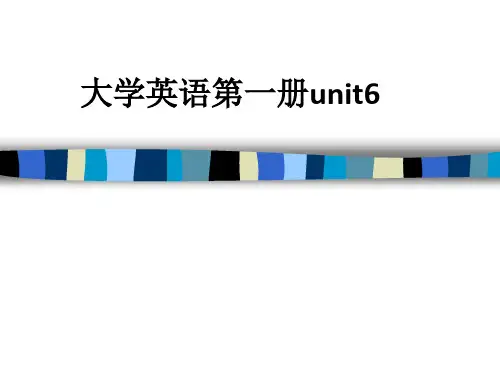


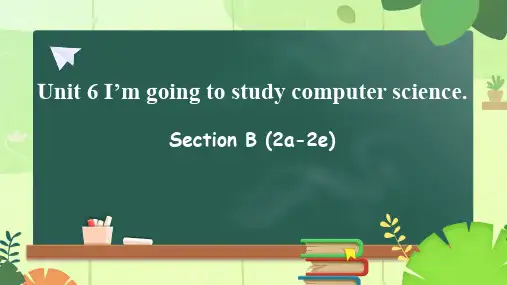
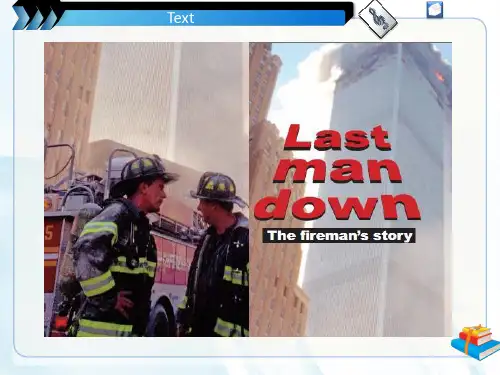
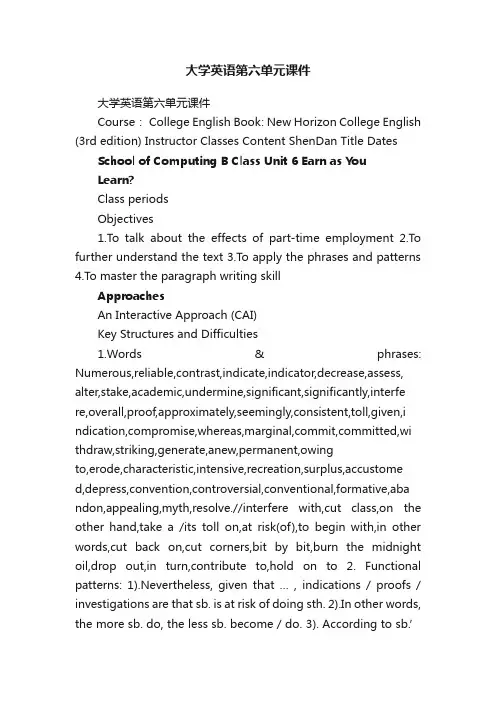
大学英语第六单元课件大学英语第六单元课件Course: College English Book: New Horizon College English (3rd edition) Instructor Classes Content ShenDan Title Dates School of Computing B Class Unit 6 Earn as YouLearn?Class periodsObjectives1.To talk about the effects of part-time employment2.To further understand the text3.To apply the phrases and patterns4.To master the paragraph writing skillApproachesAn Interactive Approach (CAI)Key Structures and Difficulties1.Words & phrases: Numerous,reliable,contrast,indicate,indicator,decrease,assess, alter,stake,academic,undermine,significant,significantly,interfe re,overall,proof,approximately,seemingly,consistent,toll,given,i ndication,compromise,whereas,marginal,commit,committed,wi thdraw,striking,generate,anew,permanent,owingto,erode,characteristic,intensive,recreation,surplus,accustome d,depress,convention,controversial,conventional,formative,aba ndon,appealing,myth,resolve.//interfere with,cut class,on the other hand,take a /its toll on,at risk(of),to begin with,in other words,cut back on,cut corners,bit by bit,burn the midnight oil,drop out,in turn,contribute to,hold on to 2. Functional patterns: 1).Nevertheless, given that … , indications / proofs / investigations are that sb. is at risk of doing sth. 2).In other words, the more sb. do, the less sb. become / do. 3). According to sb.’s studies / surveys / investigations, sth., in turn, may be linked to sth., and therefore, is likely to do sth.Class Period 1: Lead-in and Pre-reading Activities 1. Lead-in: Questions and Answers (20’)1) Why do some students want to take part-time jobs? 2) Why some students do not want to take part-time jobs? 3)What suggestions will you put forward toward students planning to work part-time?2. Pre-reading Activities (25’) 1) look and talk 2) a debate about working or not working when studying 3) Information background Class Period 2: Text Study 1.Main idea & structure(10’) 2. Language focus (10’)3. Critical thinking (25’) In-class ActivitiesClass Period 3: Text Study 1. Text Reading and Comprehending (25’) 2. Main Ideas & Structure (10’) 3. Summary (10’) Class Period 4: Practice and Exercises 1. Student presentation (15) 2. Translation Exercises (30’) Class Period 5: Pra ctice and Exercises 1. Language appreciation (20’) 2. Critical thinking (10’) 3. Writing skills (15’) Class Period 6:Practice and Exercises 1. Student presentation (15’) 2. Analyze Comprehensive Exercises(30’)Assignments1. Exercises in Section A.2. Self-study of Section B and finish the exercises in it.3. Comprehensive exercises;4. Writing assignment.MemoTo ask 2-5 students to give English speeches or make English presentations at the beginning of class period. Instructor。
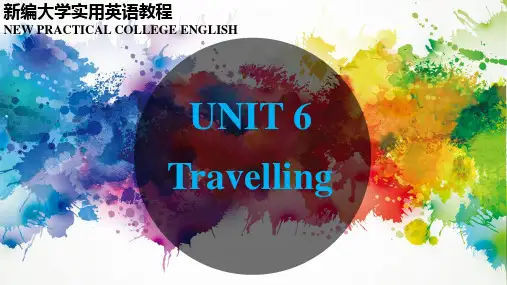
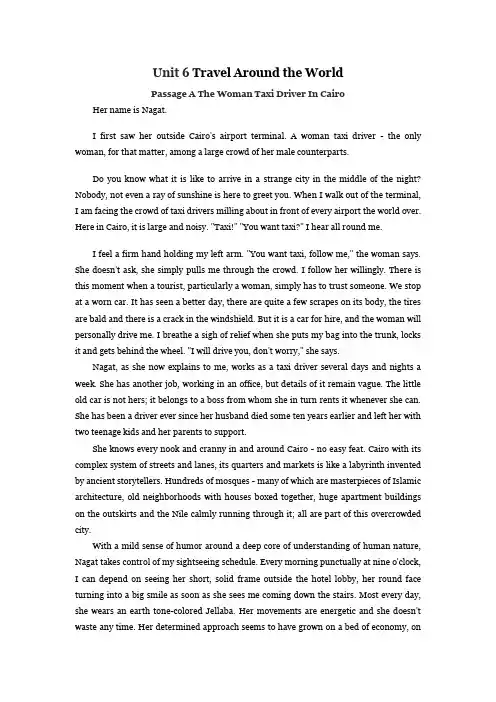
Unit 6 Travel Around the WorldPassage A The Woman Taxi Driver In CairoHer name is Nagat.I first saw her outside Cairo's airport terminal. A woman taxi driver - the only woman, for that matter, among a large crowd of her male counterparts.Do you know what it is like to arrive in a strange city in the middle of the night? Nobody, not even a ray of sunshine is here to greet you. When I walk out of the terminal, I am facing the crowd of taxi drivers milling about in front of every airport the world over. Here in Cairo, it is large and noisy. "Taxi!" "You want taxi?" I hear all round me.I feel a firm hand holding my left arm. "You want taxi, follow me," the woman says. She doesn't ask, she simply pulls me through the crowd. I follow her willingly. There is this moment when a tourist, particularly a woman, simply has to trust someone. We stop at a worn car. It has seen a better day, there are quite a few scrapes on its body, the tires are bald and there is a crack in the windshield. But it is a car for hire, and the woman will personally drive me. I breathe a sigh of relief when she puts my bag into the trunk, locks it and gets behind the wheel. "I will drive you, don't worry," she says.Nagat, as she now explains to me, works as a taxi driver several days and nights a week. She has another job, working in an office, but details of it remain vague. The little old car is not hers; it belongs to a boss from whom she in turn rents it whenever she can. She has been a driver ever since her husband died some ten years earlier and left her with two teenage kids and her parents to support.She knows every nook and cranny in and around Cairo - no easy feat. Cairo with its complex system of streets and lanes, its quarters and markets is like a labyrinth invented by ancient storytellers. Hundreds of mosques - many of which are masterpieces of Islamic architecture, old neighborhoods with houses boxed together, huge apartment buildings on the outskirts and the Nile calmly running through it; all are part of this overcrowded city.With a mild sense of humor around a deep core of understanding of human nature, Nagat takes control of my sightseeing schedule. Every morning punctually at nine o'clock, I can depend on seeing her short, solid frame outside the hotel lobby, her round face turning into a big smile as soon as she sees me coming down the stairs. Most every day, she wears an earth tone-colored Jellaba. Her movements are energetic and she doesn't waste any time. Her determined approach seems to have grown on a bed of economy, onthe necessity to get as much done as she possibly can.What becomes clear to me soon as she drives me from museum to pyramid, from one part of town to the opposite, is this: she is a true exception here. Wherever we stop, be it for a cup of tea during a break or upon arriving at a historical site where her male colleagues gather in the parking area - everywhere, she is being noticed. Men walk up to her in the car with questioning faces. As she tells me, they all have one question first of all: "Are you a taxi driver?" She then explains in a few short sentences, and I see the men's faces soften, smile and respectfully and kindly chat with her. This scene repeats itself over and over again. I get the sense that she invites goodwill from the people she meets.Nagat is proud and independent. One day, as I find her waiting outside a museum, she is just taking a spare tire out of the trunk of the taxi. One of the bald tires had finally gone flat, and she was going to change it herself. Several curious people gather around her and she receives offers of help - but no, she wants no part of that. In her efficient, deliberate manner, she changes the tire, and having done so, washes her hands with bottled water, gets in the taxi and asks "Where to now?"Should you find yourself at Cairo's airport, look for Nagat outside the international arrival hall. If you are lucky, you will have a chance to see Cairo through the eyes of a woman taxi driver.开罗的女出租车司机她叫娜格特。
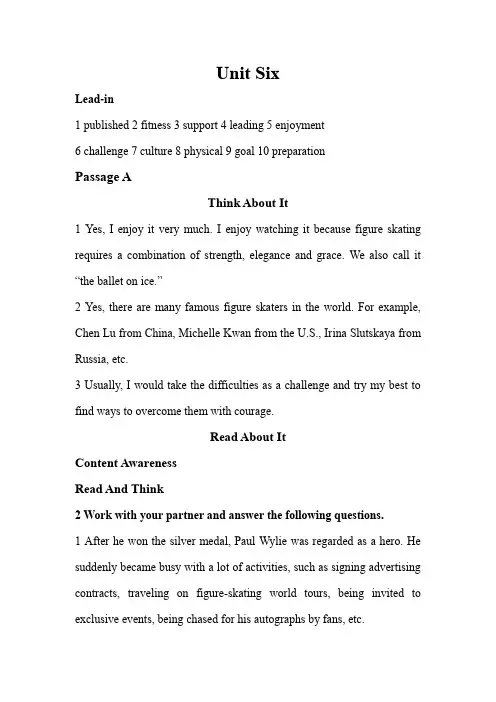
Unit SixLead-in1 published2 fitness3 support4 leading5 enjoyment6 challenge7 culture8 physical9 goal 10 preparationPassage AThink About It1 Yes, I enjoy it very much. I enjoy watching it because figure skating requires a combination of strength, elegance and grace. We also call it “the ballet on ice.”2 Yes, there are many famous figure skaters in the world. For example, Chen Lu from China, Michelle Kwan from the U.S., Irina Slutskaya from Russia, etc.3 Usually, I would take the difficulties as a challenge and try my best to find ways to overcome them with courage.Read About ItContent AwarenessRead And Think2 Work with your partner and answer the following questions.1 After he won the silver medal, Paul Wylie was regarded as a hero. He suddenly became busy with a lot of activities, such as signing advertising contracts, traveling on figure-skating world tours, being invited to exclusive events, being chased for his autographs by fans, etc.2 It implied that people were dissatisfied with Paul Wylie’s performance and lost confidence in him.3 He answered “daily” because he was undergoing an extremely difficult time in his skating career and it was hard for him to keep going.4 No, he wasn’t. Before winning the silver medal, he was a nobody whose performance at big events was usually unimpressive.5 Open.3 Decide whether the following statements are true (T) or false (F) according to the passage.1 F2 T3 F4 T5 T4 Fill in the blanks with the words given below. Change the form where necessary.1 clapped2 defend3 quit4 perfection5 interviewed6 survey7 exclusive8 storage9 observed 10 cover5 Complete the following sentences with phrases or expressions from the passage. Change the form where necessary.1 count…out2 be unaware of3 stopped in his tracks 3 at times 5 turn…around6 Find the words in Passage A according to the clues given. Then make two sentences with each of the words you have found.1He was awarded a medal for his heroic deed of saving a drowning child.Britain’s Olympic team returned from Los Angeles with five gold medals, 11 silver and 21 bronze.2 A free shuttle bus runs between the air terminal and the train station. Many passengers were stuck at the air terminal building because of the foggy weather.3 He merits promotion for his excellence in leadership and management. The committee will decide whether the case merits more serious attention.4 The music band played their routines in every city across the nation. The athlete performed her bold and difficult routines with perfection in the match.5 The sudden rise in oil prices has led to an economic crisis in the country.Relations between the two countries have reached the crisis point after rounds of talks.7 Translate the following sentences into English.1 It’s a difficult job, but I’d like to have a shot.2 This is a book about business practice as opposed to theory.3 Social activities never get in the way of her studies.4 It was not until 1911 that the first of the vitamins was identified.5 Despite advanced years, Grandpa helps do housework every day.8 Read and compare the English sentences, paying attention to theiritalicized parts, and then translate the Chinese sentences by simulating the structure of the English sentences.1 From that moment on, 11-year-old Daniel who played the leading role in the Harry Potter movies recognized that his life would never be the same.2 He was a young man who believed that he will fulfill his dream no matter how many difficulties lie in the way.3 It wasn’t until his wife was killed in the accident that he realized how important she had been in his life.4 With fairy tale book in hand, I always felt I was ushered into a world of beauty and purity.5 Just as an athlete achieves perfection by repeated training of a few actions of the larger routine day after day, a good student should make continuous efforts to improve himself on a regular basis.9 Work in pairs and retell Pa ul Wylie’s story. Then share with each other your own story of persevering and achieving success in spite of difficulties.I’d like to tell a story of my own. I was very poor at English when I was in the middle school. Although I spent a lot of time memorizing the new words, I simply couldn’t keep them in my mind. I thought I had a poor memory and I was not the stuff for it. But fortunately I didn’t give up easily. Hard as it was for me, I kept going. I decided to hang in there.Then one day, suddenly, I found I was not that bad. I got first place in an English contest held in our school. And I got very nice marks in the National College Entrance Examination. I think my success in English learning lies in my perseverance. As long as we persevere, we can reach our goals no matter how difficult they are.10 Write a paragraph of around 80 words arguing that goals can be reached no matter how many obstacles lie in the way. You can support your argument with the example of Paul Wylie or an example from your personal experience.No matter how many obstacles lie in the way, you can reach your goals as long as you don’t give up. To illustrate, look at the story of Paul Wylie, an American figure skater. Paul took part in the 1988 Calgary Olympics and 1991 World Championships, but his performance was so unimpressive that after the ’91 World Championships he was advised to quit. Paul himself had frequently thought of retirement, but he continued anyway. He decided not to give up. At last, his perseverance paid off. He won a silver medal at the 1992 Winter Olympic Games at the age of 27 and became an Olympic hero.Passage BThink About It1 Yes, I have. When I was in middle school, I weighed 72 kilos with a height of 1.60 meters. The doctor advised me to lose weight; otherwise itwon’t be good for my health. So I went on a diet.2 I keep fit by going swimming, playing badminton or football, etc.3 I usually eat foods with low calories and fat, and have more vegetables and fruit. And at the same time I go jogging at least three times a week.Read About ItContent AwarenessRead And Think11 Work with your partner and answer the following questions.1 The narrator started to reflect seriously on her weight-loss efforts when she caught her reflection in the mirror at her friend’s New Year’s Eve party.2 She had to combine her love for cooking with healthful eating.3 She felt she was in tune with her body and herself.4 She published a book of low-fat recipes and ran workshops and seminars on healthful eating.5 Open.12 Choose the best answer to each question with the information from the passage.1 B2 C3 B4 D5 C13 Fill in the blanks with the words given below. Change the form where necessary.1 deprived2 healthful3 combined4 determined5 lifestyle6 balance7 approach8 solutions9 miserable 10 deserves14 Complete the following sentences with phrases or expressions from the passage. Change the form where necessary.1 out of reach2 in tune with 3set your mind to 4 come off 5 trial and error 15 Translate the following sentences into English.1 Our marriage is happy but we’ve had many ups and downs.2 Many teachers of foreign languages are inclined to talk too much themselves in class.3 The famous actor keeps fit by working out for an hour every morning.4 After a long heart-to-heart talk with him, her suspicion melted away.5 We have no vacancies now, but we’ll certainly keep your applic ation in mind.16 Reread Finding a Balance, and then take brief notes of it. Compare your notes with a peer’s to see whether you have written down the same information.Problem: overweight, 215 pounds at age 18, 330 pounds ten years later Factors: enjoy cooking and eating; diets seemed not to work Feelings: shy, self-conscious, miserable, unhealthyTurning point: it came when realizing why diets didn’t workFinding the balance: healthful eating, cook and eat favorite foods, but make them low in fat, plus exercise17 Combine each pair of sentences below into one sentence by usingan –ing participle and omitting repeated words. Use a comma or commas to set off the -ing participle phrase from the rest of the sentences.1 Walking to the store, we get our daily exercise.2 Squeezing the tube as hard as I could, I managed to get enough toothpaste on my brush.3 Overhearing his remark, I burst out laughing.4 Setting his feet into the starting blocks, the runner stared straight ahead./The runner, setting his feet into the starting blocks, stared straight ahead.5 Cheerfully weighing bags of fruit and vegetables, the produce clerk chatted with each customer/The produce clerk, cheerfully weighing bags of fruit and vegetables, chatted with each customer.18 Combine each pair of sentences below into one sentence by using an –ed participle and omitting repeated words. Use a comma or commas to set off the -ed participle phrase from the rest of the sentences.1Bored with the talk show, I dozed off/I, bored with the talk show, dozed off.2 Crinkled with age, the old dollar bill felt like tissue paper/The old dollar bill, crinkled with age, felt like tissue paper.3 Crowded into a tiny, windowless room, the students acted nervous andedgy/The students, crowded into a tiny, windowless room, acted nervous and edgy.4 Loaded down with heavy bags of groceries, I waited for someone to open the door/I, loaded with heavy bags of groceries, waited for someone to open the door.5 Tired of his conservative wardrobe, Ron bought a green-striped suit/ Ron, tired of his conservative wardrobe, bought a green-striped suit.。
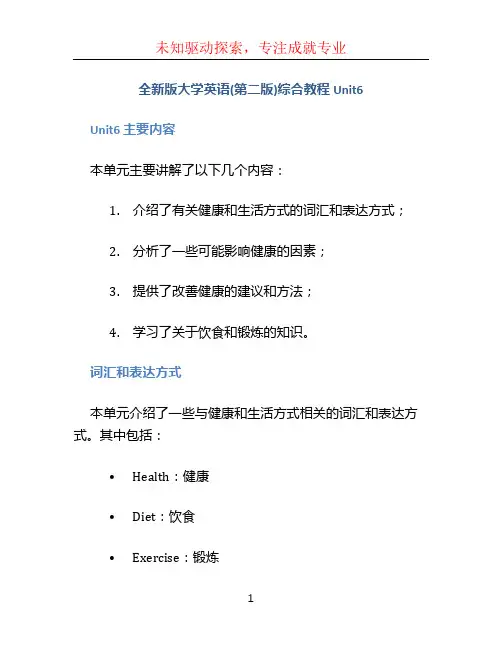
全新版大学英语(第二版)综合教程Unit6Unit6 主要内容本单元主要讲解了以下几个内容:1.介绍了有关健康和生活方式的词汇和表达方式;2.分析了一些可能影响健康的因素;3.提供了改善健康的建议和方法;4.学习了关于饮食和锻炼的知识。
词汇和表达方式本单元介绍了一些与健康和生活方式相关的词汇和表达方式。
其中包括:•Health:健康•Diet:饮食•Exercise:锻炼•Lifestyle:生活方式•Nutrition:营养•Balanced diet:均衡饮食•Sedentary lifestyle:久坐不动的生活方式•Stress:压力•Relaxation techniques:放松技巧•Body mass index (BMI):身体质量指数通过学习这些词汇和表达方式,我们可以更好地理解和讨论有关健康和生活方式的话题。
影响健康的因素在本单元中,我们分析了一些可能影响健康的因素。
这些因素包括:1.饮食:不良的饮食习惯可能导致肥胖、营养不良等健康问题;2.锻炼:缺乏锻炼可能导致肌肉萎缩、心血管问题等;3.生活方式:久坐不动、吸烟、过度饮酒等生活方式可能对健康产生负面影响;4.压力:过度压力可能导致焦虑、抑郁等心理健康问题。
了解这些因素对我们改善健康和采取相应措施至关重要。
通过调整饮食习惯、增加运动、减少不良生活方式、学会应对压力等,我们可以更好地保持健康。
改善健康的建议和方法本单元提供了一些有关改善健康的建议和方法。
以下是一些常见的建议:1.均衡饮食:合理搭配各类食物,确保摄入足够的营养;2.多锻炼:每天进行适度的有氧运动,如散步、跑步等;3.拒绝久坐:经常起身活动,做一些运动伸展;4.戒烟限酒:戒掉吸烟习惯,限制饮酒量;5.学会放松:使用一些放松技巧缓解压力,如冥想、呼吸练习等。
通过采取这些改善健康的建议和方法,我们可以提高身体和心理的健康水平,并享受更好的生活质量。
饮食和锻炼的知识在本单元中,我们还学习了一些关于饮食和锻炼的知识。
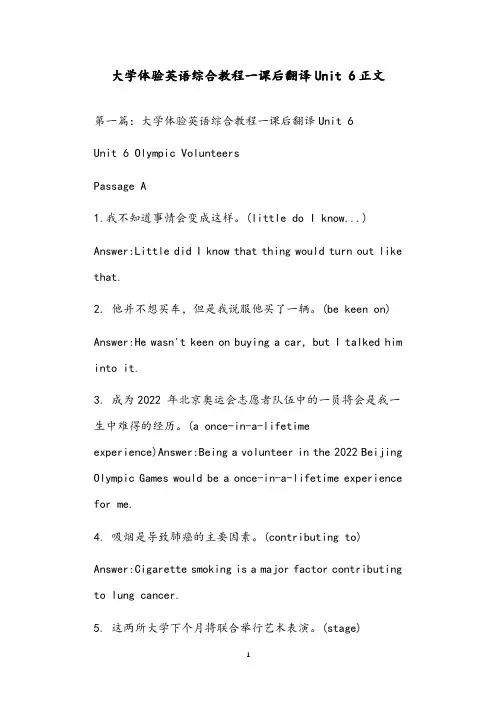
大学体验英语综合教程一课后翻译Unit 6正文第一篇:大学体验英语综合教程一课后翻译Unit 6Unit 6 Olympic VolunteersPassage A1.我不知道事情会变成这样。
(little do I know...) Answer:Little did I know that thing would turn out like that.2. 他并不想买车,但是我说服他买了一辆。
(be keen on) Answer:He wasn't keen on buying a car, but I talked him into it.3. 成为2022 年北京奥运会志愿者队伍中的一员将会是我一生中难得的经历。
(a once-in-a-lifetimeexperience)Answer:Being a volunteer in the 2022 Beijing Olympic Games would be a once-in-a-lifetime experience for me.4. 吸烟是导致肺癌的主要因素。
(contributing to) Answer:Cigarette smoking is a major factor contributing to lung cancer.5. 这两所大学下个月将联合举行艺术表演。
(stage)Answer:The two universities will unite to stage an art show next month.Passage B1. 北京将于2022 年举办第29 届夏季奥运会。
(host) Answer:Beijing will host the 29th Summer Olympic Games in the year 2022.2. 充足的新鲜空气有助于身体健康。
(contribute to) Answer:Plenty of fresh air contributes to good health.3. 无论发生什么情况,他就是一言不发。
⼤学英语第六单元课件⼤学英语第六单元课件 Course: College English Book: New Horizon College English (3rd edition) Instructor Classes Content ShenDan Title Dates School of Computing B Class Unit 6 Earn as You Learn? Class periods Objectives1.To talk about the effects of part-time employment2.To further understand the text3.To apply the phrases and patterns4.To master the paragraph writing skill Approaches An Interactive Approach (CAI) Key Structures and Difficulties 1.Words & phrases: Numerous,reliable,contrast,indicate,indicator,decrease,assess,alter,stake,academic,undermine,significant,significantly,interfere,overall,proof,approximately,seemingly,consistent,toll,given,indication,compromise,whereas,marginal,commit,committed,withdraw,striking,generate,anew,permanent,owingto,erode,characteristic,intensive,recreation,surplus,accustomed,depress,convention,controversial,conventional,formative,abandon,appealing,myth,resolve.//interfere with,cut class,on the other hand,take a /its toll on,at risk(of),to begin with,in other words,cut back on,cut corners,bit by bit,burn the midnight oil,drop out,inturn,contribute to,hold on to 2. Functional patterns: 1).Nevertheless, given that … , indications / proofs / investigations are that sb. is at risk of doing sth. 2).In other words, the more sb. do, the less sb. become / do. 3). According to sb.’ s studies / surveys / investigations, sth., in turn, may be linked to sth., and therefore, is likely to do sth. Class Period 1: Lead-in and Pre-reading Activities 1. Lead-in: Questions and Answers (20’) 1) Why do some students want to take part-time jobs? 2) Why some students do not want to take part-time jobs? 3)What suggestions will you put forward toward students planning to work part-time?2. Pre-reading Activities (25’) 1) look and talk 2) a debate about working or not working when studying 3) Information background Class Period 2: Text Study 1.Main idea & structure(10’) 2. Language focus (10’)3. Critical thinking (25’) In-class Activities Class Period 3: Text Study 1. Text Reading and Comprehending (25’) 2. Main Ideas & Structure (10’) 3. Summary (10’) Class Period 4: Practice and Exercises 1. Student presentation (15) 2.Translation Exercises (30’) Class Period 5: Practice and Exercises 1. Language appreciation (20’) 2. Critical thinking (10’) 3. Writing skills (15’) Class Period 6:Practice and Exercises 1. Student presentation (15’) 2. Analyze Comprehensive Exercises(30’) Assignments1. Exercises in Section A.2. Self-study of Section B and finish the exercises in it.3. Comprehensive exercises;4. Writing assignment. Memo To ask 2-5 students to give English speeches or make English presentations at the beginning of class period. Instructor。
Course: College English Book: New Horizon College English (3rd edition) Instructor Classes Content ShenDan Title DatesSchool of Computing B Class Unit 6 Earn as YouLearn?Class periodsObjectives1.To talk about the effects of part-time employment2.To further understand the text3.To apply the phrases and patterns4.To master the paragraph writing skillApproachesAn Interactive Approach (CAI)Key Structures and DifficultiesClass Period 1: Lead-in and Pre-reading Activities 1. Lead-in: Questions and Answers (20’)1) Why do some students want to take part-time jobs? 2) Why some students do not want to take part-time jobs? 3)What suggestions will you put forward toward students planning to work part-time?2. Pre-reading Activities (25’) 1) look and talk 2) a debate about working or not working when studying 3) Information background Class Period 2: Text Study 1.Main idea & structure(10’) 2. Language focus (10’)3. Critical thinking (25’)In-class ActivitiesClass Period 3: Text Study 1. Text Reading and Comprehending (25’) 2. Main Ideas & Structure (10’) 3. Summary (10’) Class Period 4: Practice and Exercises 1. Student presentation (15) 2. Translation Exercises (30’) Class Period 5: Practice and Exercises 1. Language appreciation (20’) 2. Critical thinking (10’) 3. Writing skills (15’) Class Period 6:Practice and Exercises 1. Student presentation (15’) 2. Analyze Comprehensive Exercises(30’)Assignments1. Exercises in Section A.2. Self-study of Section B and finish the exercises in it.3. Comprehensive exercises;4. Writing assignment.MemoTo ask 2-5 students to give English speeches or make English presentations at the beginning of class period. Instructor。
Unit 6 Psychological HealthPassage A Is It Healthy to Be a Football Supporter?— Why Fans Know the ScoreDie-hard football fans hit the heights when their team wins and reaches the depths of despair when they lose. Scientific studies show the love affair with a team may be as emotionally intense as the real thing, and that team clashes have gladiatorial power. What's going on? Why do fervent fans have hormonal surges and other psychological changes while watching games? Why does fans' self-esteem soar with victory and plummet in defeat, sometimes affecting their lives long afterwards? Why do people feel so drawn to form such deep ties to teams? Is avidly rooting for a team good or bad for your health? You may find the answers surprising.THE FAN'S PERSONALITYPsychologists often portray die-hard fans as lonely misfits searching for self-esteem by identifying with a team,2 but a study suggests the opposite. It reveals that football fans suffer fewer bouts of depression and alienation than people who never watch Match Of The Day. Hard-core fans also demonstrate a fierce and unbreakable bond. It's possible to trace the roots of fan psychology to a primitive time when warriors fighting to protect their tribes were the true representatives of their race. In modern times, so the theory goes, professional sportsmen are warriors of a city or country fighting a stylized war waged on a football pitch.IT'S WAR OUT THERESome confrontations on the pitch are gladiatorial. In this respect, our sports heroes are our gladiators. A football match, especially between rival teams, isn't some light-hearted display of athletic prowess. The self is emotionally involved in the outcome because whoever you're rooting for represents YOU. So professional footballers seem to recreate the intense emotions in some fans that tribal warfare aroused in their forebears. It could even be that these emotions have fueled the explosion in the popularity of sports over the past 20 years.STATUS BY PROXYSo, through football matches, it becomes possible to gain respect from your rivals, albeit vicariously . This means you can be highly regarded not for your own achievement, but through your connection to a team that wins. Or, if you like, by your connection to individual footballers for their skill, such as midfielder David Beckham, winger Ryan Giggs, and striker Thierry Henry.The connection, however, can be fickle. Bragging sports fans tend to claim credit fortheir team's success, saying "we won" to describe a victory, but distance themselves from a team's failure, saying "they lost" describing a defeat.LOYAL TO THE ENDA raft of studies has found that "highly-identified" fans - both men and women - are unlikely to abandon a team when it's doing badly. Anyone who's read Fever Pitch by Nick Hornby knows that this is true of the ardent Arsenal fan. Not only that, they tend to blame their team's failures on a biased referee or on bad luck, rather than on Arsenal's mistakes or the other team's skill. It's not surprising that these avid fans get more psychologically aroused at games and spend more money on tickets and merchandise.IS TESTOSTERONE A FACTOR?Testosterone levels in male fans rise markedly after a victory but drop just as sharply after a defeat. Apparently the same pattern has been documented in male animals who fight over a female. Biologists think that the human animal may have evolved this way to end conflicts quickly. If so, it provides an interesting biological explanation of football hooliganism after big matches. Science backs up this theory. Testosterone levels were measured in 21 Italian and Brazilian men in Atlanta before and after Brazil's victory over Italy in soccer's 1994 World Cup. The Brazilians' testosterone rose 28 per cent on average, while the Italians' levels dropped 27 per cent.CAN BEING A FAN DAMAGE YOUR HEALTH?Yes, it can. Indeed it can be fatal. The tension felt by football fans during penalty shoot-outs can trigger heart attacks and strokes in male spectators. On the day Holland lost to France in Euro 96, deaths there from heart attacks and strokes rose by 50 per cent. GROUP IDENTITYBeing an ardent fan could be simply the desire to belong to a group or a society - a need once answered by religion and politics. This explains why some fans remain loyal through thick and thin, and despite the repeated failure of their teams. Surrounding yourself at a match with people who so clearly espouse your own enthusiasms, and identifying your tribal membership with hats, scarves , Mexican waves and songs, makes you feel you belong as little else does. What's more, you're part of a group where no questions are asked, explanations are unnecessary and where you can always rely on support. With so many traditional institutions like religion and family beginning to break down, the football crowd is the perfect family.A HEALTHIER OUTLOOK?In most cases, a deep attachment to a team is healthy. Several studies show that an intense interest in a team can stave off depression and foster feelings of self-worth andbelonging. That applies to all ardent sports fans. All human beings - including football fans - share the basic psychological need to belong. Without religion, without family, something has to answer that need. Today football, above all other sports, fills that crucial voidA人爱好足球有利健康吗?—为什么球迷知道真相当球队取胜时,铁杆球迷会兴奋到极点;而当球队失败时,又会极度低迷。